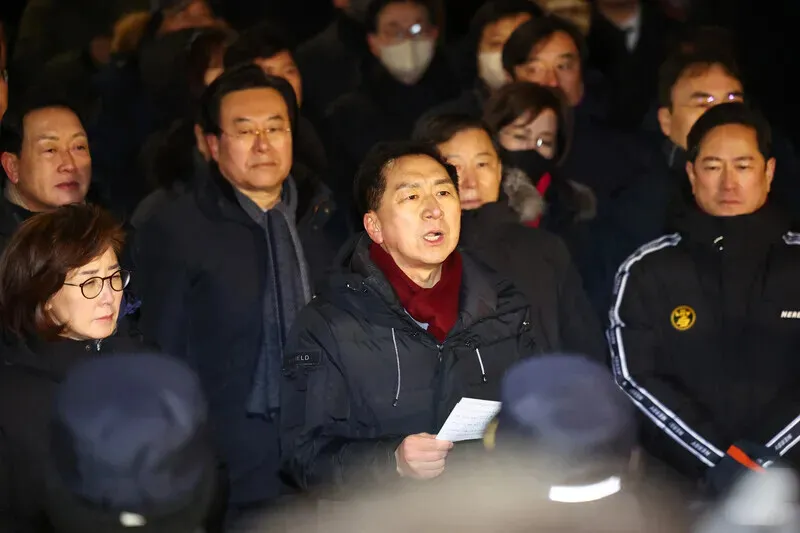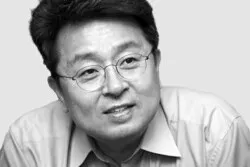hankyoreh
Links to other country sites 다른 나라 사이트 링크
[Column] The far-right cartel destroying South Korea


By Rhee Cheol-hee, former lawmaker and senior secretary for political affairs under Moon Jae-in
The writer Chin Jung-kwon has described President Yoon Suk-yeol’s mental state as “quixotic.” The word comes from the novel “Don Quixote” by Spanish writer Miguel de Cervantes. “In the novel, Don Quixote rides a haggard horse. He mistakes a line of windmills as giants, a herd of sheep as an army, and the daughter of a farmer as a noblewoman. This pursuit of delusions through the abandonment of reality is called quixotism.” Yoon has fallen into delusion and abruptly declared martial law. Even after his failed coup, he is determined to fight to the end. It would be very fitting to call him “Yoon Quixote.”
However, the political, ideological and historical identity that Yoon has revealed is no departure. His actions are not those of a crazed man who has simply fallen behind the times. They are the continuation and fortification of what philosopher Lee McIntyre called the “political subordination of reality.” In other words, it’s the result of the emotional polarization of Korean society playing out through political parties clashing and antagonizing each other. It’s also a monster whose appearance was forecast by the rise and popularization of the far right. Trump’s bizarre comments and behavior may make it seem like Trumpism is an unprecedented mutant, but a closer look reveals that he is a perfect fit for the far right of the US Republican Party. Yoon’s political identity is also far right.
How would the “Republic of Suk-yeol” that Yoon imagined have turned out? There is a hint. We can first look to Turkish President Recep Tayyip Erdoğan. “Democracy is like a tram. You ride it until you arrive at your destination, then you step off.” After he became prime minister, he got off the tram and revealed his dictatorial instincts. Obviously, the opposition was fierce, and a military regime soon moved to remove him from power. Erdoğan used this as an excuse to declare a national emergency and begin an extensive campaign of suppression. Tens of thousands of civil servants were arrested, 4,000 judges and prosecutors were terminated, and over 100 media outlets were shut down. Erdogan succeeded in suppressing political opposition and elevated himself to dictator status. It was a reversal of events that Yoon surely envies.
Next is Viktor Orbán of Hungary. Orbán emerged victorious in the 1998 parliamentary election, becoming prime minister at age 35. He was then defeated in the 2002 election. It seemed like his story was over, but he took power again eight years later. The belief among his supporters that his 2002 defeat was the result of election fraud was a key factor in his comeback. Since retaking power, he has utilized the “dictatorial breakthrough” of placing independent institutions like the judicial branch, the press, and universities under party control, setting the foundations for stabilizing his rule. This dictatorial breakthrough converts the “rule of law” into “the law of rule.” Yoon likely viewed martial law as his dictatorial breakthrough.
Yoon and the People Power Party (PPP) coalition is a far-right alliance. Since 2010, the conservative PPP has strayed from the agenda of democracy, peace and entitlement programs. As they endured the Park Geun-hye impeachment, they came to view hostility toward their opponents as the key to their survival, turning over a new leaf as a far-right party. Without considering this hostility and far-right transformation, it is impossible to understand their embarrassing acceptance of a person who has criminally prosecuted numerous conservative politicians, including two former presidents from their own party, as their president. It is also difficult to explain their unity with Yoon, who faces impeachment, and their capture by the far right, which has produced the insanity of them opposing impeachment.
Paul Pierson and Eric Schickler of UC Berkeley claim that political hostility is a unique fixture of American politics. They argue that hostility between factions has resulted in the US effectively becoming two separate countries, which they discuss in their book “Partisan Nation.” They compare political disputes to tribal warfare and describe the disputes and battles of “good and evil” among people based on political alliances as “partyism” and “partisanism.” Regardless of the term used, it refers to a blind support of one’s party, irrespective of ideology: My party is always right, and the opposition is always wrong.
Yoon attempted to revert things through martial law; Trump attempted to do it by mobilizing his supporters to engage in the riot at the Capitol. Both Yoon and Trump were subjected to impeachment proceedings. With Trump, public polls revealed that 70% of the general public thought he was responsible, compared to 52% of Republicans. But did public support for Trump fall after the riot on Jan. 6, 2021? How much? Did Trump recover? When?
According to Sam van Noort, a lecturer at Princeton University, a poll conducted around 10 days after the Capitol riot revealed that support for Trump among Republicans fell by 11 percentage points compared to before the riot. Approval for Trump fell by 4.6 percentage points, while disapproval increased by 6.3 percentage points. Considering that this range of fluctuation was exhibited even before the Jan. 6 assault on the Capitol, the riot’s impact on public approval ratings was minimal. Even more surprising is that polls conducted a month after the riot revealed that public support for the Republican Party was only 3.7 percentage points lower than before Jan. 6. This is an astonishing recovery.
According to an analysis conducted by Gregory Eady, a professor at the University of Copenhagen, social media activity indicated a general aversion to Trump and the Republican Party after the riot. In the three weeks that followed Jan. 6, around 7% of social media users erased any posts that contained words hinting at support for Republicans. Considering the extreme polarization of current circumstances, this is encouraging. However, this trend did not last for even two months.
According to a study by Taeku Lee and others, “J6 induced backlash against Trump amongst co-partisans, though this backlash was short-term and persisted at most two months post-J6 and at worst only a few weeks” (see: “White Power! How White Status Threat Undercuts Backlash Against Anti-democratic Politicians”).
Blind partisan loyalty persisted, in spite of the Capitol being violently overtaken for the first time since the British burned it down in 1814.
How could such a recovery have happened? Sam van Noort points to the messages and narratives of party elites. They criticized Trump following the incident. But after some time had passed, they began downplaying the incident’s importance, engaging in strategic denial by hinting that Trump had virtually no role in the incident, and defending Trump. Dissenting voices were suppressed amid rumblings of traitors, and they stoked factional loyalty through massive campaigns through partisan media and social media. This resulted in their support ratings rebounding.
Milan Svolik, a professor at Yale University, explains the phenomenon through ideological polarization. In an ideologically divided landscape like the US, even if one’s own side engages in anti-democratic behavior, they avoid reprimanding it: The opposition is so fundamentally different from me that he is not an option, so I have no choice but to support my side.
This partisanism explains why the “far-right cartel” of Yoon, most of the PPP, commercialized far-right social media, and the Taegeukgi rallies encouraged and supported martial law and why a significant portion of conservatives are rallying to save Yoon. “The opponent is the devil, so we must do whatever we can to defeat him” — that is the attitude. Amid the backdrop of martial law and the impeachment proceedings, the conservatives are being pushed out by the far right, who are taking over.
“Propaganda must facilitate the displacement of aggression by specifying the targets for hatred.”
“If you tell a lie big enough and keep repeating it, people will eventually come to believe it.”
These are two truths worshipped by the far-right cartel. That is why they yell: “Not Lee Jae-myung!” A glance at recent polls revealed that the strategy is working. Is it really? (Oh, that’s right. The two quotes are from Joseph Goebbels, Hitler’s chief propagandist.)
Please direct questions or comments to [english@hani.co.kr]

Editorial・opinion
![[Editorial] Asia Future Forum brings bright minds together to explore democracy’s future [Editorial] Asia Future Forum brings bright minds together to explore democracy’s future](https://flexible.img.hani.co.kr/flexible/normal/500/300/imgdb/original/2025/1024/1317612945603513.jpg) [Editorial] Asia Future Forum brings bright minds together to explore democracy’s future
[Editorial] Asia Future Forum brings bright minds together to explore democracy’s future![[Column] Russia and China’s golden ticket to destabilizing the dollar [Column] Russia and China’s golden ticket to destabilizing the dollar](https://flexible.img.hani.co.kr/flexible/normal/500/300/imgdb/original/2025/1023/2117612083961121.jpg) [Column] Russia and China’s golden ticket to destabilizing the dollar
[Column] Russia and China’s golden ticket to destabilizing the dollar- [Correspondent’s column] Martial law comes for the United States
- [Column] The end of the road for NewJeans, or a new beginning?
- [Editorial] Korea must prepare for rough road ahead with Japan
- [Editorial] Korea cannot afford to rush to a deal with the US
- [Column] Shared dilemmas at a historic turning point for Korea, Europe
- [Column] Halfway across the world, I’m cheering on Americans fighting for democracy
- [Column] How meritocracy turns into tyranny
- [Column] The real scandal of Korea’s ‘divorce of the century’
Most viewed articles
- 1Xi and Trump bring their battle to Gyeongju
- 2Korea allows same-sex couples to check ‘spouse’ box on census for first time
- 3[Column] Facing our fear of the “welfie” in “All of Us Are Dead”
- 4Cyberbullying and serial celebrity suicides
- 5Japan’s new PM orders revision of 3 key national security documents
- 6Korea’s response to martial law crisis a model of 3 strategies for defending democracy, says Levitsk
- 7Survey: after-school academies the biggest source of students’ stress
- 8Real-life heroes of “A Taxi Driver” pass away without having reunited
- 9S. Korean chaebols comprise 84% of GDP but only 10% of jobs
- 10German TV channel removes documentary on Korea for failure to meet journalistic standards